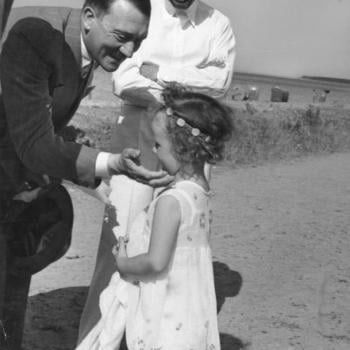Time magazine declared Stanley Hauerwas “America’s best theologian.” That was in 2001. His response to the encomium was ” ‘best’ is not a theologial category.”
Hauerwas has long been a controversial theologian and ethicist–especially since his book (published Gifford Lectures) With the Grain of the Universe in which he blasted Reinhold Niebuhr as not Christian. Of course, he was referring to Niebuhr’s theology and ethics, not his personal salvation.
One Hauerwas critic I read rightly (I think) said that he has a tendency to say somewhat outrageous things and then, when challenged, back off of them at least somewhat.
I had the privilege of spending about 90 minutes with Hauerwas recenty (in a small group) and found him to be humble but predictably opinionated. “Not that there’s anything wrong with that” (to quote Jerry Seinfeld). Even in his most opinionated statements, however, I found him open to challenge if not correction.
A critic has recently published a book calling Hauerwas “liberal.” Well, I haven’t read the book yet, but I intend to–with as open a mind as possible. But I think the label “liberal” is getting stretched to the breaking point. Hauerwas is and always has been all about prophetically challenging Christianity, the churches, about our accommodations to modernity. Yale historian Claude Welch defined “liberal theology” as “maximal ackowledgement of the claims of modernity.”
Overall and in general, in spite of my probaby incurable Niebuhrian impulses, I agree with Hauerwas that the churches’ main job is to be the church that Christ intended them to be.
The way I put it (not Hauerwas here) is that we Christians need to realize that we are living in “enemy occupied territory.” Our “government in exile” is Jesus and his Kingdom. Our calling is to be faithful to our “government in exile” and resist–without violence–using prophetic non-cooperation–the “principalities and powers” that dominate our world.
Again, going beyond Hauerwas (perhaps), I would say that insofar as we are not being persecuted we are probably as much collaborators as faithful resisters.
In my humble opinion, for what it is worth, and not claiming Hauerwas as my inspiration, I regard the main power/principality American Christians need to resist non-violently but with prophetic speech and action is Social Darwinism. We are a society built on Social Darwinism–and were before such a concept existed. “Rugged individualism” combined with the idea that helping the weak and the poor creates dependence and so we should do it only occasionally in special acts of charity but not as a matter of course–especially not in terms of social structures–either inside or outside the church–that offer preferential treatment to the weakest among us.
The Kingdom Jesus inaugurated was clearly an “upside down Kingdom” (Donald Kraybill) that rejected the natural human tendency to admire and extend privilege to the strong and powerful.
Some years ago, when Francis became pope, I posted here an essay claiming not to care who is pope because the Bishop of Rome does not speak for me. I am changing my mind. I recently saw a picture of Francis washing the feet of a group of homeless men–including non-Christians.
Sure, by itself that would only be symbolic. But symbols matter (Tillich) and that was an act of symbolic power–sending a message to the world that Christianity at its best is service to the “least” among us.
When Dom Helder Camara became Archbishop of Recife, Brazil, he refused to live in the bishop’s palace and turned it into a shelter for the homeless. Another powerfully symbolic Kingdom act.
Our world, including America, for the most part, is dominated by a mindset that admires the rich and powerful and extends to them special privileges. The church is called to something else–to be a church of the weak, the poor, the outcasts, the marginalized, the powerless.
















